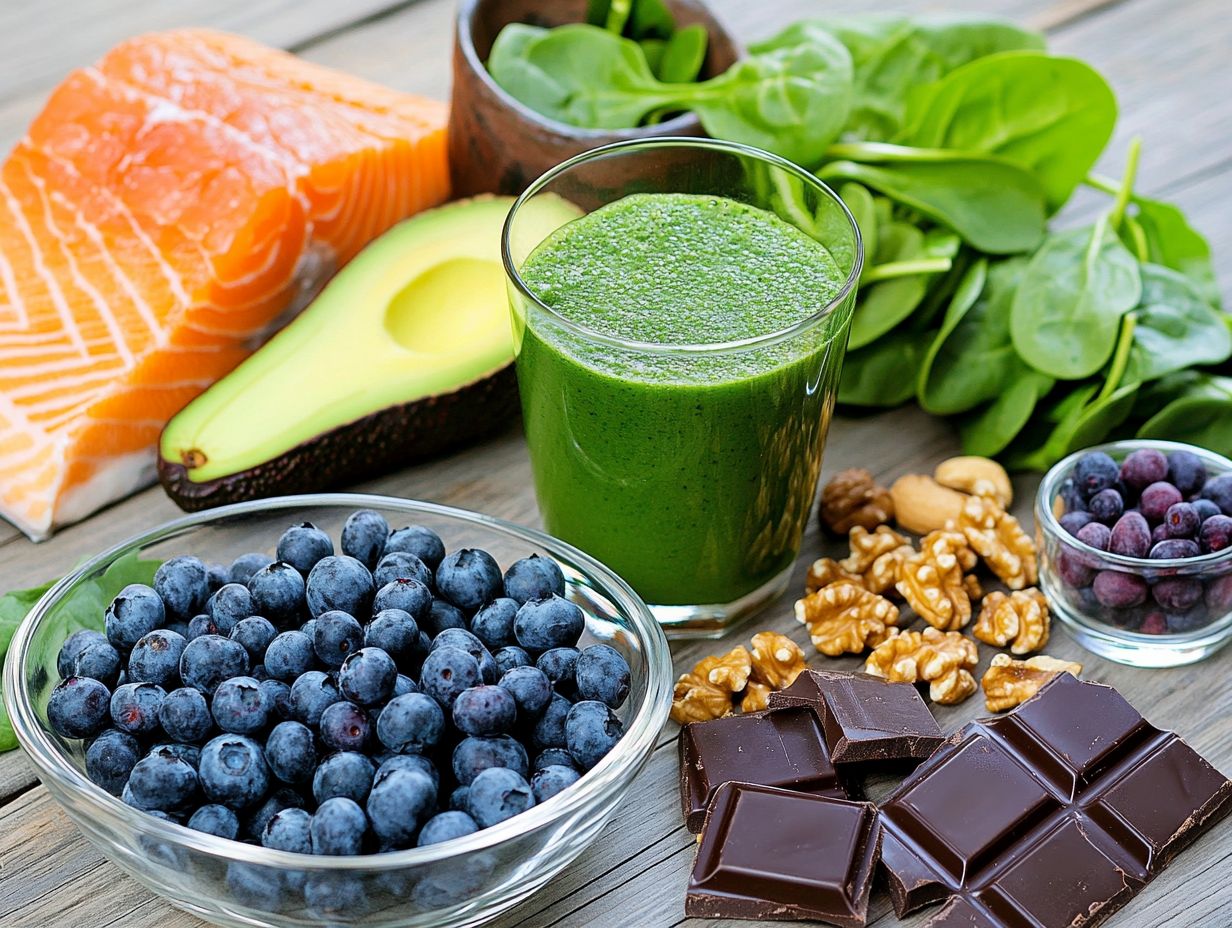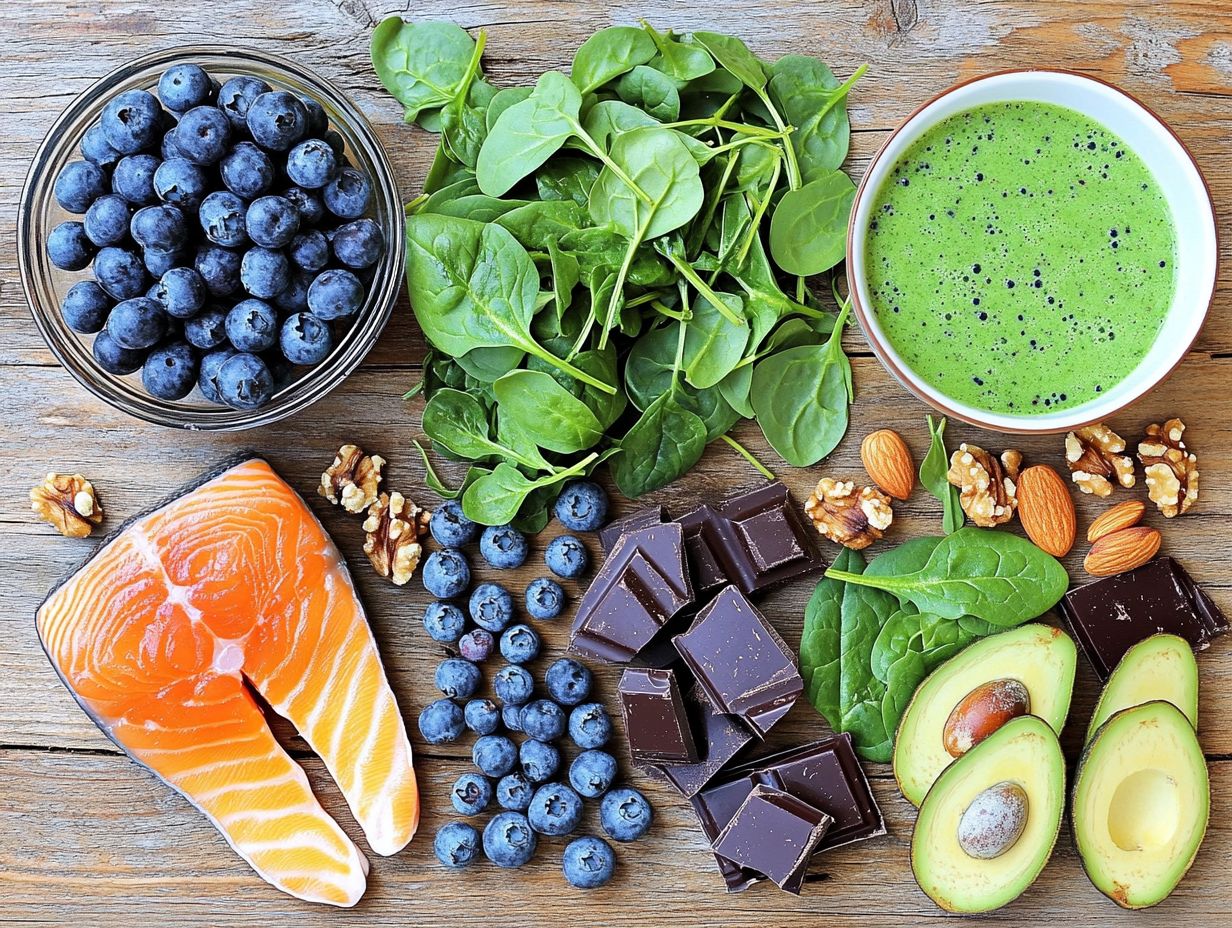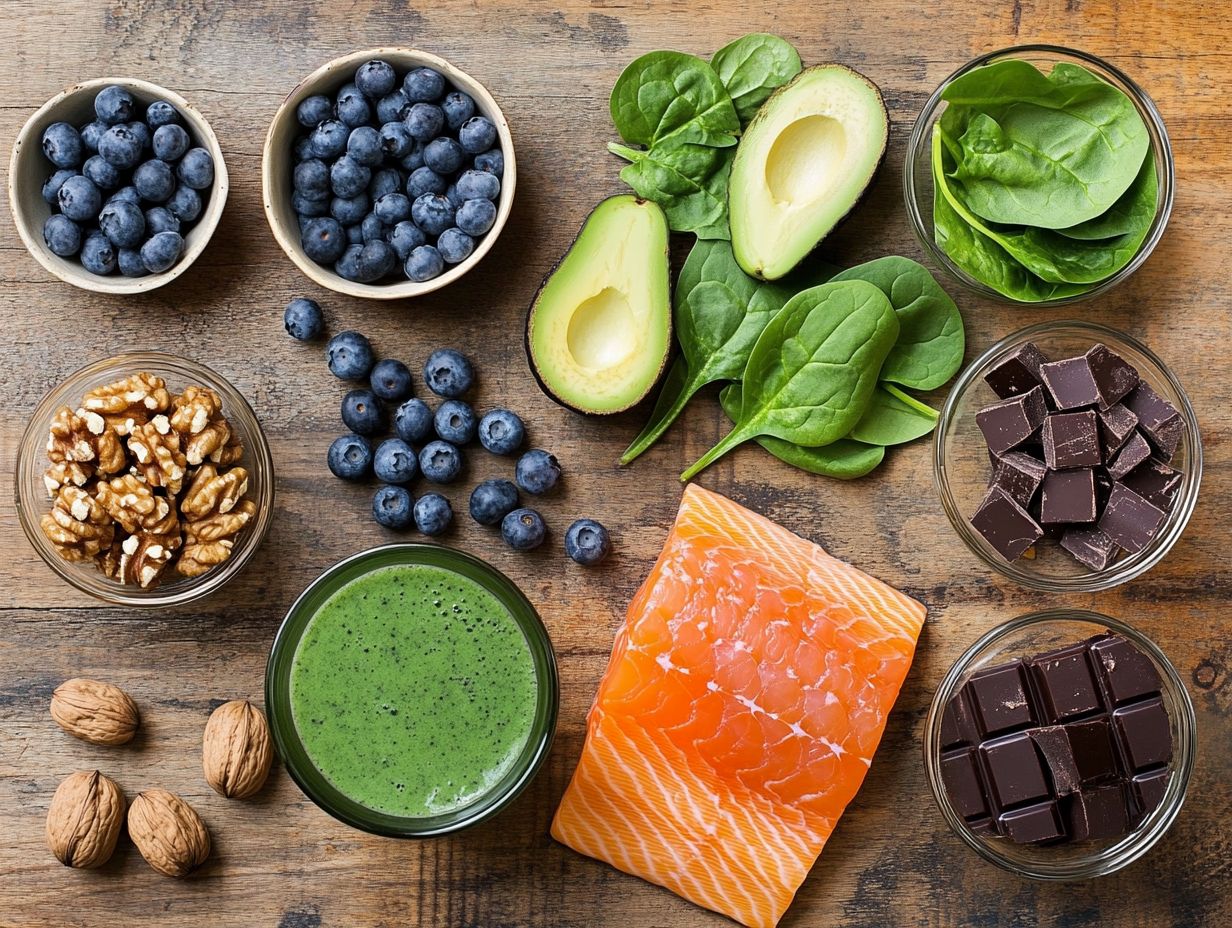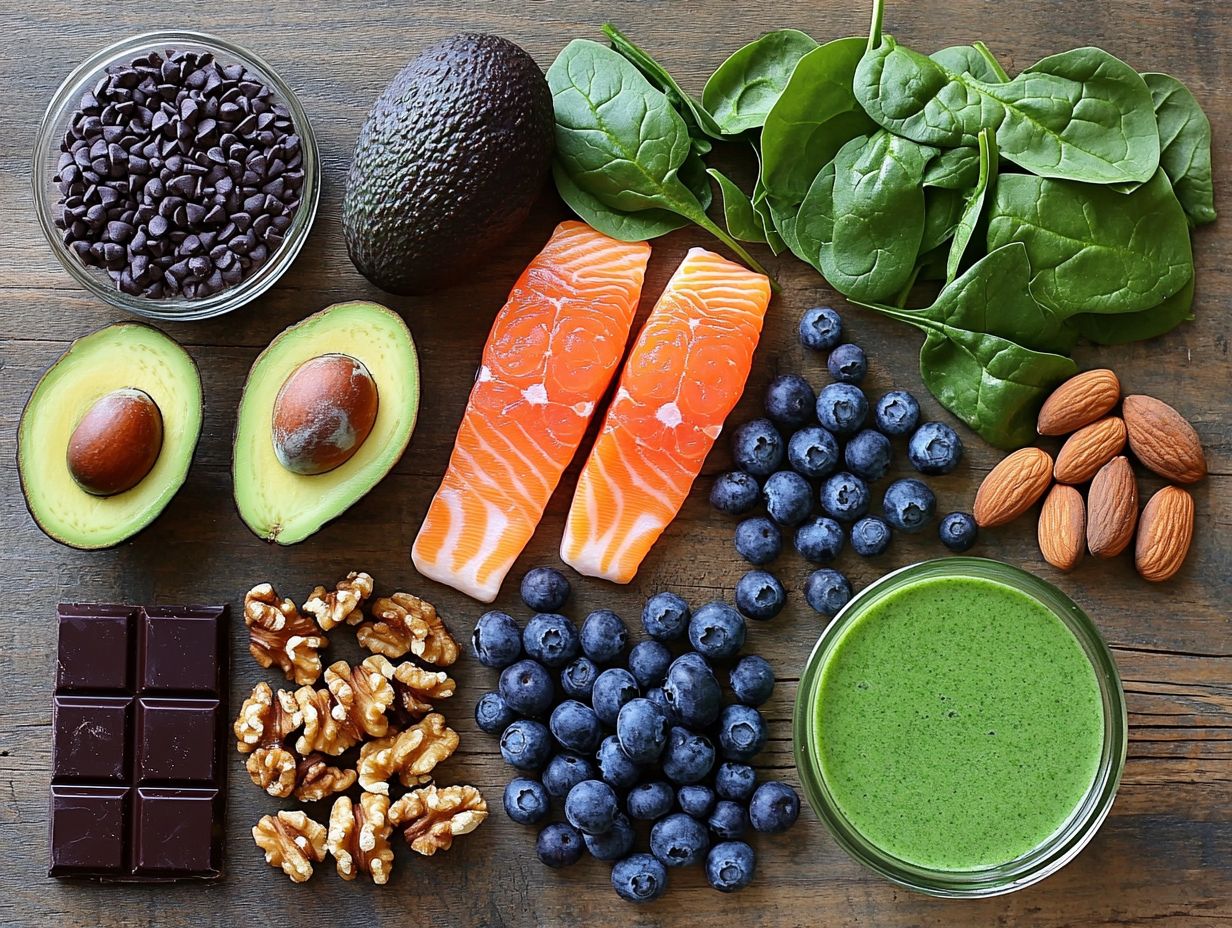What Are the Best Foods for Brain Health?
Maintaining brain health is crucial for your cognitive function, memory, and overall well-being. What you consume plays a significant role in influencing your brain s performance and longevity.
This article delves into the top foods that nourish your brain think fatty fish, vibrant leafy greens, and yes, even dark chocolate. It also highlights other essential factors, such as exercise, sleep, and social connections, all of which contribute to keeping your mind sharp.
Explore how these elements can harmonize to enhance your brain health!
Contents
- Key Takeaways:
- Why Diet is Important for Brain Health
- Brain-Boosting Foods You Shouldn’t Miss!
- Other Factors for Maintaining Brain Health
- Frequently Asked Questions
- What are the best foods for brain health?
- How do these foods benefit the brain?
- Are there any specific foods that are known to improve brain health?
- Can these foods also help prevent age-related cognitive decline?
- Are there any foods that should be avoided for brain health?
- Can a healthy diet alone improve brain health?
Key Takeaways:

- Eating fatty fish, blueberries, nuts, and seeds can support brain health.
- Exercise, sleep, and social connections are vital for a healthy brain.
- A balanced diet is fundamental for cognitive function.
Why Diet is Important for Brain Health
Your diet plays an essential role in maintaining optimal brain health. It supplies vital nutrients that support cognitive function and enhance memory.
A well-balanced diet, rich in omega-3 fatty acids, antioxidants, and B vitamins, can significantly help slow down memory loss and lower the risk of Alzheimer’s disease. This ensures your brain operates at its best.
Diets such as the Mediterranean and DASH diet are especially beneficial. They embrace a variety of healthy foods that nourish the brain, enhance memory, and promote overall mental well-being.
Brain-Boosting Foods You Shouldn’t Miss!
Start adding brain-boosting foods to your diet today for a sharper mind. Foods rich in omega-3 fatty acids, like fatty fish, are celebrated for their ability to enhance memory and learning.
The antioxidants in blueberries and dark chocolate work wonders in combating inflammation and neutralizing free radicals. Nuts, seeds, and whole grains provide essential nutrients that foster mental clarity and sustained energy. Embracing these choices can truly transform your cognitive vitality.
Fatty Fish
Fatty fish, especially varieties like salmon, are game-changers for your brain health! They are packed with omega-3 fatty acids that are essential for optimal brain function. These healthy fats play a crucial role in maintaining synapses, enhancing memory, and slowing down cognitive decline.
Other options like mackerel and sardines offer similar benefits due to their rich omega-3 content. These fatty acids, particularly EPA and DHA, are vital for constructing brain cell membranes and supporting neurotransmitter function.
A study published in the journal ‘Neurology’ revealed that individuals who indulge in fatty fish at least once a week experience a slower rate of cognitive decline compared to those with minimal fish intake. The anti-inflammatory properties of omega-3s also contribute significantly to overall brain health, making these fish an essential part of a balanced diet focused on preserving cognitive function.
Blueberries
Blueberries are a treasure trove of antioxidants that combat inflammation and oxidative stress in the brain. Incorporating these delightful berries into your diet regularly can improve your memory and significantly reduce the risk of chronic diseases that impact brain health.
These little powerhouses are rich in flavonoids, especially anthocyanins, which boost neuronal signaling and promote overall brain health. A study in “Frontiers in Aging Neuroscience” found that older adults who enjoyed blueberries regularly showed notable improvements in cognitive performance compared to those who skipped these fruits.
Research from the University of Exeter suggests that just a few servings of blueberries each week could lower the risk of cognitive decline and memory loss. This highlights the remarkable influence these fruits can have in keeping your mind sharp as you age.
Start making these delicious changes to your diet today!
Nuts and Seeds

Nuts and seeds are packed with healthy fats, protein, and essential vitamins vital for brain health. They are rich in vitamin E and choline, which protect your brain and support your thinking skills.
Walnuts are a standout choice due to their high omega-3 fatty acids, which promote brain cell growth. Almonds are also great; they are loaded with vitamin E that helps reduce cognitive decline.
Sunflower seeds are full of antioxidants that combat inflammation, ensuring your brain functions at its best. Mix these nutrient-dense foods into your meals to boost your cognitive health and fight memory loss!
It s a simple way to enhance your diet while enjoying every bite!
Leafy Greens
Dark leafy greens are your secret weapon for a healthy brain, packed with a wealth of vitamins and nutrients. These greens are bursting with B vitamins, antioxidants, and other essential compounds that elevate your thinking skills and help stave off memory loss.
Kale, spinach, and collard greens truly rise to the occasion. Kale is rich in vitamin K, known to support cognitive enhancement. Spinach provides a significant dose of iron and folate, essential for optimal brain function.
Don’t forget collard greens; they are loaded with vitamin C and fiber, crucial for overall brain vitality. Incorporating these greens into your diet slows cognitive decline and boosts memory.
Avocados
Want to keep your brain sharp? Avocados are more than just a tasty treat; they are brimming with healthy fats that enhance brain function and support overall cognitive health. Their abundance of vitamins plays a crucial role in promoting blood flow to the brain essential for peak performance.
These creamy delights are an exceptional source of monounsaturated fats, particularly oleic acid. This powerful component helps reduce inflammation and improve circulation throughout your body.
Rich in vitamins E and K, avocados work tirelessly to protect your brain cells from oxidative stress. Add avocados to your meals to supercharge your mental sharpness!
Whole Grains
Want to fuel your brain? Whole grains offer a consistent source of energy crucial for your brain health, helping you maintain concentration throughout the day. Packed with nutrients, they enhance your overall mental performance.
Consider incorporating quinoa, brown rice, and oats into your diet. Their high fiber content and complex carbohydrates provide a steady energy supply, preventing that dreaded mid-afternoon slump.
Research shows that diets rich in whole grains correlate with improvements in memory, attention, and mood stabilization. Individuals who consume more whole grains tend to perform better on cognitive tests, reinforcing the importance of these nutrient-dense foods.
Dark Chocolate
Dark chocolate is not merely a delightful indulgence; it s also packed with antioxidants that can significantly boost your brain health and cognitive function. When you enjoy dark chocolate in moderation, you may find it linked to improved memory. This can potentially slow cognitive decline.
This benefit largely stems from the high levels of flavonoids present in dark chocolate, which are known to enhance blood flow to the brain, promoting neuroplasticity the brain’s ability to adapt and change. Numerous studies suggest that these compounds can elevate cognitive performance, especially in tasks that demand sustained focus and quick thinking.
For example, research published in the Journal of Psychopharmacology reveals that participants who consumed dark chocolate rich in flavonoids demonstrated superior attention and memory retention compared to those who did not indulge. Such insights indicate that incorporating dark chocolate into your diet can satisfy your sweet tooth while also playing a promising role in maintaining cognitive health as you age.
Other Factors for Maintaining Brain Health

Maintaining your brain health goes beyond mere dietary choices; it encompasses a variety of factors that significantly influence your cognitive function and overall mental well-being.
Engaging in regular exercise not only enhances blood flow to your brain but also invigorates your mood and sharpens your focus. Quality sleep is essential for memory consolidation, and effective stress management along with robust social connections creates a holistic approach to nurturing your mind.
By prioritizing these elements, you can elevate your mental agility and foster a more resilient state of mind.
Exercise and Sleep
Regular exercise and quality sleep are essential for your brain health, significantly enhancing cognitive function and memory retention. When you engage in physical activity, you boost blood flow to your brain. Sleep facilitates crucial processes like memory consolidation.
Research underscores that individuals who exercise regularly often excel in cognitive tasks compared to those who lead a sedentary lifestyle. A study published in the journal ‘Neuropsychology’ found that aerobic exercise can lead to marked improvements in attention and executive function.
Another study in ‘Nature Reviews Neuroscience’ showed sleep’s critical role in clearing toxins from the brain, a vital process for optimal processing and learning.
Together, these lifestyle choices not only sharpen your mental clarity and focus but also promote emotional well-being, reducing the risk of cognitive decline as you age. Therefore, prioritizing both physical activity and restorative sleep can pave the way for a sharper mind and a more resilient mental state.
Stress Management
Effective stress management techniques can supercharge your mental health and cognitive function by reducing inflammation and promoting overall brain wellness. Chronic stress can lead to memory loss and cognitive decline, making it essential for you to prioritize stress management as a key component of brain health.
Integrating practices such as mindfulness, meditation, and regular exercise into your daily routine provides invaluable tools for mitigating stress. Mindfulness encourages you to remain present and cultivate awareness, which studies have shown decreases levels of the stress hormone cortisol.
Meditation, on the other hand, has been linked to improved gray matter density in areas of the brain responsible for memory and emotional regulation. Engaging in physical exercise not only releases endorphins that boost your mood but also fosters neurogenesis, the growth of new neurons.
Research indicates that these techniques collectively support cognitive resilience, effectively combating the detrimental effects of stress on your brain function.
Social Connections
Strong social connections are essential for your mental health and cognitive function. They offer emotional support and alleviate feelings of isolation. Engaging in social activities promotes brain health and enhances your memory.
Numerous studies reveal that individuals who actively nurture relationships with friends and family enjoy better cognitive outcomes as they age. Research published in esteemed journals like ‘Psychological Science’ indicates that social engagement fosters improved brain adaptability, allowing it to reorganize itself more effectively.
Regular interactions with community members can diminish the risk of cognitive decline by instilling a sense of belonging and purpose.
Participating in activities such as volunteering or engaging in group hobbies stimulates your mind and nurtures emotional bonds. These activities serve as a protective shield against stress-related mental decline.
Frequently Asked Questions
What are the best foods for brain health?

The best foods for brain health are those rich in nutrients such as omega-3 fatty acids, antioxidants, and vitamins and minerals. Including options like fatty fish, berries, nuts, seeds, leafy greens, and whole grains can also contribute to heart health.
How do these foods benefit the brain?
These foods are powerful allies for your brain! Omega-3 fatty acids help improve cognitive function and protect against age-related cognitive decline. Antioxidants shield the brain from oxidative stress, while vitamins and minerals support the production and function of neurotransmitters.
Are there any specific foods that are known to improve brain health?
Yes, certain foods are known to specifically improve brain health. These include avocados, turmeric, dark chocolate, and green tea. They contain compounds linked to improved memory, focus, and overall brain function.
Absolutely! These foods can help prevent age-related cognitive decline. As we age, our brain function naturally declines, but incorporating these brain-boosting foods into our diets can slow down this decline and keep our brains healthy and sharp.
Are there any foods that should be avoided for brain health?
Stay away from processed foods, refined sugars, and unhealthy fats to protect your brain today! These foods have been linked to inflammation and oxidative stress in the brain, which can harm cognitive function and increase the risk of brain-related diseases.
Can a healthy diet alone improve brain health?
A healthy diet is crucial for maintaining good brain health, but it is not the only factor. Regular exercise, quality sleep, and mental stimulation are also essential for keeping the brain functioning at its best. Maintaining a healthy lifestyle overall is vital for optimal brain health.




